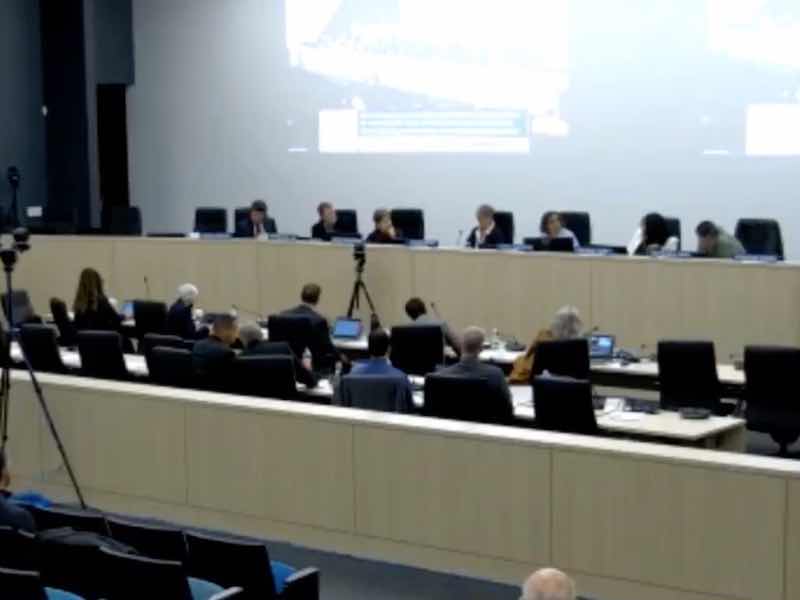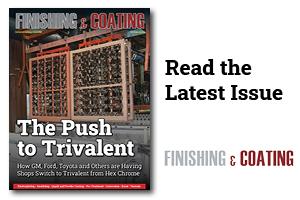Finishers using hexavalent chromium in California have less than two weeks to respond to amendments to the California Air Resources Board proposal to phase out existing facilities over the next 10 years.
Following a January CARB hearing on the proposed rule — the Airborne Toxic Control Measure for Chromium Electroplating and Chromic Acid Anodizing Operations — the board had its staff come up with an alternative phase-out plan that would allow decorative plating facilities to continue to use hexavalent chromium in their chrome plating processes for a limited time beyond January 1, 2027.
“Are they incompetent, or is this just a form of corruptness?” Leiker says.
The new date is the beginning of 2030, as long as decorative chrome plating facilities show they have complied with new building enclosure requirements to reduce fugitive emissions by 2026.
Vote Could Come in May
 Bryan LeikerBryan Leiker, Executive Director of the Metal Finishing Association of California, says he expects the CARB board to vote on the final measures at their meeting in late May.
Bryan LeikerBryan Leiker, Executive Director of the Metal Finishing Association of California, says he expects the CARB board to vote on the final measures at their meeting in late May.
Leiker says their association is disappointed in CARB’s proposed amendments as the MFAC had tried to dissuade the board from enacting the new phase-out rules for the past several years. He was especially incensed that the CARB staff admitted its emissions data presented to the board in January was flawed, but yet nothing was done by the board to halt the process.
“Are they incompetent, or is this just a form of corruptness?” Leiker says. “They are basing this rule on information that is not correct. Their calculations are wrong in their emission inventories, so doesn’t that change because the rule was based on incorrect information? This is a big mess.”
By CARB rules, they will open the comment period for 15 days until April 11. But Leiker says the board rules say that comments can only be directed at the amendments, such as the move day from 2027 to 2030.
Possibility of Legal Action
At this point, Leiker says the MFAC and its board of directors are looking at all possibilities, including bringing legal action against CARB because of the errors in the data that were used to establish the proposed rules.
“That’s what we’re looking at right now,” Leiker says. “We don’t have the ear of (CARB) anymore. We’ve tried talking to the board members, but nobody is listening. We have no path forward to stop this from happening, so legal is really the only way that we can put a stop to this rule.”
“People are wondering now, ‘the value of my business has collapsed,’”
CARB added an amendment to the rule [Section 93102.4(b)(1)(A)] that allows moving of the phase-out for decorative chrome from 2027 to 2030 if shops made modifications to their facility, writing “Facilities that elect to continue using Hexavalent Chromium for the purposes of Decorative Chrome Plating after January 1, 2027, shall submit a notification to the District as required by Appendix 1 by January 1, 2025, indicating that they are electing to pursue the alternative phase out pathway. Facilities that elect to comply with the alternative phase-out pathway must comply with the Building Enclosure requirements set forth in subsection (d) starting on January 1, 2026, and shall not use any Hexavalent Chromium for the purposes of Decorative Chrome Plating in California after January 1, 2030.”
The CARB staff writes that “Building enclosures will reduce the release of fugitive emissions from decorative chrome plating facilities in the interim period before the phase-out goes into effect.”
Banning New Shops in 2023, Phase Out Functional in 2039
The rules still ban any new chromium electroplating and chromic acid anodizing operations starting after January 1, 2024. CARB also wants to phase out the use of hexavalent chromium in functional plating — hard plating and chromic acid anodizing— by January 1, 2039.
Leiker says that shop owners in California that fall under these provisions are having a very difficult time as they see the value of their company decreasing significantly, as well as the possibility of losing employees and customers in the interim.
"I’m almost ready to just recommend to people to just pack their bags and move out of here.”
“People are wondering now, ‘the value of my business has collapsed,’” Leiker says. “Their only options now are to close down their tank lines and then try to see if the land is salvageable to be sold. They’ve lost all the equity, and the value in their business is gone.”
Leiker says the CARB decision is being pushed forward by environmental groups in California and that it may be hard to ever win a favorable decision in the state.
“It’s hard to fight the big agencies and to win in California,” he says. “But those are the things we’re going to have to weigh the odds on. It’s the cost of a lawsuit, but if anybody has a good case, I think we have one of the best. It just makes zero sense what’s happening in the state, and I’m almost ready to just recommend to people to just pack their bags and move out of here.”



































